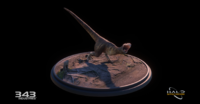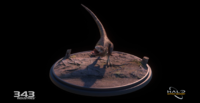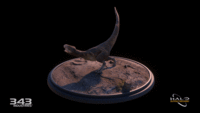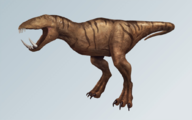Morolaath
From Halopedia, the Halo wiki
- Olympia Vale: "Those strange dinosaur-looking creatures?"
- 000 Tragic Solitude: "In your tongue it means 'blind wolf,' though it has been some time since humans have encountered them."
- — Installation 00's monitor explains morolaath to diplomat Olympia Vale.[1]
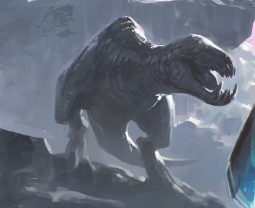
Morolaath, colloquially known as "blind wolves," are predatory creatures found on various Forerunner installations.[1][3] They are formidable pack hunters that primarily rely on sound to direct their attacks.[1][4] Known to humans in the ancient past, operatives of the United Nations Space Command have observed morolaath on Installation 00 and at least one Halo ring in the modern era.[1][3]
Overview[edit]
Biology and physiology[edit]
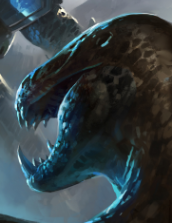
With several variations known to exist,[6][7] morolaath somewhat resemble Earth's carnivorous theropod dinosaurs, being scaly bipedal creatures with three clawed toes on each foot.[3][4][8] Unlike theropods, however, they possess neither eyes nor arms.[4] Morolaath have gargantuan fangs which extend from the bottoms of their jaws and sharp teeth which line their upper jaws. Their nostrils, situated at the tips of their snouts, are flared to improve their sense of smell. It is their hearing, however, that morolaath primarily rely on to perceive their surroundings;[6][7] they are able to react to relatively loud sounds from some distance away and also take notice of something as quiet as a human sighing from ten meters away.[4][8]
Morolaath have long tails and powerful legs which allow even a small group to make the ground rumble when running at high speeds and affording them the ability to leap through the air.[4][5][8] Their strong, wide jaws are capable of tearing a human's head from their body.[4][8] Certain parts of their anatomy are more susceptible to injury than others, and a few rounds from a rifle fired at point-blank range into one's mouth and out the back of its head is enough to kill it.[8]
Behavior[edit]
Morolaath are predatory carnivores which hunt in small packs led by an alpha.[1][4] While hunting, they have been observed slowly striding toward potential prey with their heads low to the ground, sweeping them from side to side like conning towers. When noise signals the presence of a target, they may bolt toward it, only to slow down with confusion or irritation should the target move silently away in time. This change in emotional state manifests itself through random snapping of their teeth in the air or howling.[4] When speeding in for an attack, morolaath may clack their jaws together.[8] They are known to make low growling sounds, and the roaring or howling noises they make sound eerily similar to those of Earth's wolves.[2][4][8]
While multiple variations of morolaath have been encountered, they are all territorial apex predators that closely guard areas important to them, such as riverbanks they need to drink from.[2][6][7] Those that encroach on these locales may find themselves set upon by the pack which claims it.[2] The pack mentality of morolaath can be overridden by fear, in which case a larger or more intimidating creature can cause a pack to retreat and slink away rather than engage it.[8] Prolonged gunfire is especially likely to upset them, leaving them disoriented as they scramble about to locate targets amidst the cacophony.[8]
Morolaath could be readily keyed by the Forerunners to inhabit specific hunting ranges, and their acute senses make them well-suited as a "tripwire species" for detecting early Flood infestation and incursions by unauthorized sapient parties.[6][7] Those on Installation 00 that were bred by 000 Tragic Solitude were specially imbued with a genetic predisposition to attack interlopers while the monitor was in control.[2]
Habitat[edit]
As morolaath were modified by the Forerunners so that they could suit different hunting ranges,[6][7] these creatures have been found to inhabit several different biomes. Possibly lending to their differing variations, morolaath have thus far been witnessed inhabiting snowy plains,[4] rocky badlands,[5] desert-like regions,[3] forested marshes,[9] and riverbanks[2] on Installation 00 and an unidentified Halo Installation.[2][3][4]
History[edit]
Distant past[edit]
Long ago, morolaath were known to ancient humans and were among the creatures preserved by the Librarian in preparation for the activation of the Halo Array in 97,445 BCE.[1][10][11] Following this destructive event, they were seeded upon at least one Halo installation while also being left to flourish on Installation 00, far beyond the edge of the Milky Way galaxy.[1][3]
Modern encounters[edit]
- "If I were to guess, I'd say that many of the species on this installation had been predisposed to attacking us because of their genetic disposition. When the monitor—this Tragic Solitude, as it called himself—bred these creatures, it must have done it with particular genetic triggers that it could control through some impulse or neural communication system."
- — Doctor Luther Mann reaches a conclusion about the behavior of morolaath and other creatures encountered on the Ark.[2]
In December 2552, the unfinished Installation 08 was fired above Installation 00, resulting in the destruction of many sentient creatures which inhabited its surface.[12][13][14][Note 1] Installation 00's monitor, 000 Tragic Solitude, eventually then began to reintroduce many live forms to the installation's refugia, breeding some for specific purposes. Among these were more morolaath, at least some of which the monitor imbued with particular genetic triggers it could control through some impulse or neural communication system. In this way, they were made servile to him, but were also predisposed to attack any future interlopers Solitude did not expressly allow to pass by them unmolested.[2]
In March 2555, a team of humans and Sangheili representing the United Nations Space Command and Swords of Sanghelios, respectively, encountered a pack of six morolaath shortly after traveling to Installation 00.[4] The group managed to escape detection at first, but the appearance of chaefka created a commotion which drew the morolaath to join the ensuing struggle.[4] Those that survived were chased off, but a couple of them returned shortly thereafter only to be discouraged from further violence this time by an animal which resembled a large gomphothere or mammoth.[8] One other pack was encountered during that particular mission on the extragalactic installation, but it retreated under a barrage of gunfire.[2]
Morolaath were later observed on at least one Halo installation and footage of them was obtained by OQ-45 Honeybee drones and broadcast to Earth for viewing by civilians attending an Outpost Discovery event.[3][15][Note 2] When the Office of Naval Intelligence's Materials Group designed the HRUNTING/YGGDRASIL Mark I [J] armor defense system, it was equipped with sonic emitters meant for the specific purpose of repelling morolaath.[16] Similarly, Emerson Tactical Systems has designed the UTIL/EmerSound Mark I shoulder pauldrons for GEN3 MJOLNIR Powered Assault Armor which incorporate acoustic hailers intended to deter morolaath and other dangerous predators found on Halo installations.[17]
Production notes[edit]
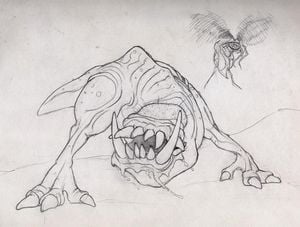
- Shi Kai Wang: "Look, it's the blind wolf!"
- Marcus Lehto: "Big, beloved blind wolf."
- Shi Kai Wang: "That was back when you could ride it."
- Marcus Lehto: "Yeah, yeah. You could actually mount the thing and ride it. A.I.... A.I. couldn't, uh... Couldn't handle it on the A.I. side. Couldn't flock 'em, couldn't, uh... fit them into gameplay."
- — Marcus Lehto, Halo: Combat Evolved art director, and Shi Kai Wang, a concept artist, discuss the attempts made to include "blind wolves" in the first Halo game.[19]
The "blind wolf" was a creature designed by Halo: Combat Evolved art director Marcus Lehto to be included in that game.[19][20] According to that early design, a blind wolf would have a symbiotic relationship with some kind of insectoid creature.[21] This "bug" would plant its stinger at the base of the wolf's cranium and in this way allow it to see through the eyes of the bug.[22] Then, when the blind wolf caught and killed its prey, the bug would be permitted to share in eating the carcass of whatever had been killed.[21][22] Not only would blind wolves exist in groups in some environments of the game, but they were planned to be able to be ridden by the player's character.[19] Ultimately, they had to be cut from the game because of problems with artificial intelligence.[19] In Halo 2, the blind wolf was referenced by an ambient announcement on the multiplayer map Terminal.[14]
In 2007 a Halo massively multiplayer online game being worked on by Ensemble Studios was cancelled.[23] Called Titan and set during the time of the Forerunners, one known piece of concept art for the game shows a creature referred to in the artwork as a "jaggmaw sailtail," which bears a strong resemblance to the blind wolf cut from Halo: Combat Evolved.[19][23][24] The jaggmaw sailtail is drawn as a an eyeless bipedal carnivorous creature lacking any form of forelimbs, but unlike the blind wolf it bears notable protrusions along the dorsal surface of its tail. The largest of these is used in the imagery to mount a seat occupied by a Jiralhanae rider.[23] When a Halo-themed texture pack was released for Minecraft in 2014, it allowed horses in the game to be re-skinned to resemble "blind wolves."[25] The blind wolves were formally introduced to canon the following year in the novel Halo: Hunters in the Dark, where they were also first identified as morolaath.[1]
Gallery[edit]
This image shows a three-dimensional model of a blind wolf created for Halo: Combat Evolved.[19]
This image provides a more detailed look at the unused model of a blind wolf.[18]
The player character rides a blind wolf in an early build of Combat Evolved.[19]
Blind wolves restored into Combat Evolved in the Digsite project.
N'tho 'Sraom and Spartan Frank Kodiak face off against several morolaath on the cover art for Halo: Hunters in the Dark.[5]
This portion of a promotional image for The Making of The Ring Experience at Halo: Outpost Discovery shows how morolaath appear within the experience.[3][15]
A blind wolf reacts to a UNSC OQ-45 Honeybee drone flying by it.[3]
A blind wolf as they appear in the Halo Encyclopedia (2022 edition).
List of appearances[edit]
- Halo 2 (First mentioned)
- Halo: Hunters in the Dark (First appearance)
- Halo Wars 2
- Halo: Outpost Discovery
- Halo Infinite (Mentioned only)
Notes[edit]
- ^ The Halo 2 multiplayer map Terminal, set in 2552 New Mombasa, includes audible public announcements, one of which informs those present that a child's "My Pet Blind Wolf" toy has been found and that its owner should claim it at a lost and found. 000 Tragic Solitude claimed in 2555 that it had been some time since humans had encountered morolaath. Whether this announcement should be treated as nothing more than an Easter egg or as actually having canonical implications is unknown.
- ^ Halo: Outpost Discovery, a traveling experience canonically set at some point between 2554 and 2557, includes an attraction called "The Ring Experience" which involves viewing a live feed from a OQ-45 Honeybee drone exploring a Halo ring. Multiple morolaath can be seen in the environment. The planet which the ring is shown orbiting discounts the possibility that it could be Delta or Gamma Halo, and executive producer of The Ring Experience, Jason Ambler, believes it is supposed to be Zeta Halo. If this is the case, the experience cannot be set any earlier than the point in 2555 when the exploration of that installation began. 000 Tragic Solitude's claim in Halo: Hunters in the Dark that morolaath had not been encountered by humans for some time would also suggest they had not been seen elsewhere before those who traveled to the Ark ran into some. Officially, the identity of the installation shown in The Ring Experience is presently undefined by 343 Industries. It should also be noted that the canonical dating of Outpost Discovery may be able to be further narrowed by a display which claims it is believed 343 Guilty Spark was destroyed in 2552. It was in late 2555 that the UNSC first learned of this monitor's survival, as established in Chapter 13 of Halo: Renegades. However, it's very possible that the UNSC would have kept this information from the general public.
Sources[edit]
- ^ a b c d e f g h i j Halo: Hunters in the Dark, chapter 12
- ^ a b c d e f g h i j Halo: Hunters in the Dark, chapter 18
- ^ a b c d e f g h i Halo: Outpost Discovery, The Ring Experience
- ^ a b c d e f g h i j k l m n Halo: Hunters in the Dark, chapter 9
- ^ a b c d Halo: Hunters in the Dark, Cover art
- ^ a b c d e Halo Encyclopedia (2022 edition), page 363
- ^ a b c d e Halo Waypoint, Canon Fodder - Cutting Room Lore (Retrieved on Jul 26, 2022) [archive]
- ^ a b c d e f g h i j Halo: Hunters in the Dark, chapter 10
- ^ Halo Wars 2, Phoenix Logs: "A Tensed Bolt" artwork
- ^ Halo Waypoint, Canon Fodder - Array With Words (Retrieved on Aug 14, 2020) [archive]
- ^ Halo Waypoint, Librarian (Retrieved on Oct 29, 2021) [archive]
- ^ Halo: Hunters in the Dark, chapter 1
- ^ Halo Mythos, page 122
- ^ a b Halo 2, multiplayer map Terminal: Intercom voicelines
- ^ a b Halo: Outpost Discovery, The Making of The Ring Experience
- ^ Halo Wars 2, Phoenix Logs: Green Machine
- ^ Halo Infinite, Armor Hall: UTIL/EmerSound Mark I - Shoulder Pad Description "Acoustic hailer tuned to deter blind wolves and other dangerous predators known to be indexed on Halo rings."
- ^ a b Twitter, Marcus Lehto (@game_fabricator): "@Dr_Abominable @HaloFanForLife @HaloArchive Hah - and my old sketch too!" (Retrieved on Jul 4, 2024) [archive]
- ^ a b c d e f g h Halo 2, Limited Collector's Edition
- ^ Twitter, Paul Russell (@Dr_Abominable): "Oh sweet! When I designed the blind wolf for CE, it had a symbiotic relationship with a large insect which would plant a stinger at the base of the wolf’s cranium giving the wolf the ability to “see” through the insects. Blind wolf kills prey, insect cleans up the mess." (Retrieved on Oct 30, 2020) [archive]
- ^ a b Twitter, Paul Russell (@Dr_Abominable): "@HaloFanForLife @game_fabricator @HaloArchive Bug was the blind wolf's eyes. Symbiosis. It leads blind wolf to prey, gets to eat carcass." (Retrieved on Oct 30, 2020) [archive]
- ^ a b Twitter, Marcus Lehto (@game_fabricator): "Oh sweet! When I designed the blind wolf for CE, it had a symbiotic relationship with a large insect which would plant a stinger at the base of the wolf’s cranium giving the wolf the ability to “see” through the insects. Blind wolf kills prey, insect cleans up the mess." (Retrieved on Jul 4, 2024) [archive]
- ^ a b c Gamasutra, Exclusive: Ensemble Studios' Canceled Project Was Halo MMO (Retrieved on Jul 26, 2022) [archive]
- ^ Twitter, Graeme Devine (@zaphodgjd): "@xemu can maybe fill you in a bit more than me? It’s long canceled along with Ensemble, was set in the age of the Forerunners." (Retrieved on Jul 4, 2024) [archive]
- ^ Halo Mash-Up: Minecraft Evolved, Horse mob
- ^ Halo: Combat Evolved marketing, Halo E3 2000 trailer
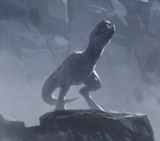
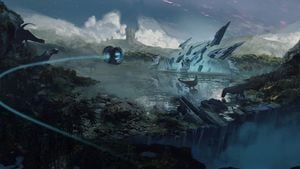
![This image shows a three-dimensional model of a blind wolf created for Halo: Combat Evolved.[19]](https://halo.wiki.gallery/images/thumb/c/c5/BlindWolf.jpg/160px-BlindWolf.jpg)
![This image provides a more detailed look at the unused model of a blind wolf.[18]](https://halo.wiki.gallery/images/thumb/c/ce/Blind_wolf_-_deletemat_%28textured%29.jpg/160px-Blind_wolf_-_deletemat_%28textured%29.jpg)
![A pack of blind wolves run past a Warthog in an early build of Halo: Combat Evolved.[19]](https://halo.wiki.gallery/images/thumb/3/39/Blind_Wolves.jpg/161px-Blind_Wolves.jpg)
![The player character rides a blind wolf in an early build of Combat Evolved.[19]](https://halo.wiki.gallery/images/thumb/8/8b/BlindWolfCut2.PNG/200px-BlindWolfCut2.PNG)
![A Warthog drives past a blind wolf in the first trailer shown for Combat Evolved.[26]](https://halo.wiki.gallery/images/thumb/c/c8/BlindWolfTrailer.PNG/154px-BlindWolfTrailer.PNG)
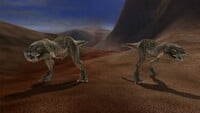
![N'tho 'Sraom and Spartan Frank Kodiak face off against several morolaath on the cover art for Halo: Hunters in the Dark.[5]](https://halo.wiki.gallery/images/thumb/2/2a/Hunters_in_the_Dark_full_cover.jpg/173px-Hunters_in_the_Dark_full_cover.jpg)
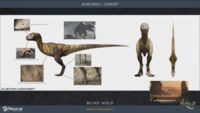
![This portion of a promotional image for The Making of The Ring Experience at Halo: Outpost Discovery shows how morolaath appear within the experience.[3][15]](https://halo.wiki.gallery/images/thumb/8/84/HOD_MorolaathSide.PNG/147px-HOD_MorolaathSide.PNG)
![A blind wolf reacts to a UNSC OQ-45 Honeybee drone flying by it.[3]](https://halo.wiki.gallery/images/thumb/b/b0/HOD_Morolaath.PNG/164px-HOD_Morolaath.PNG)
